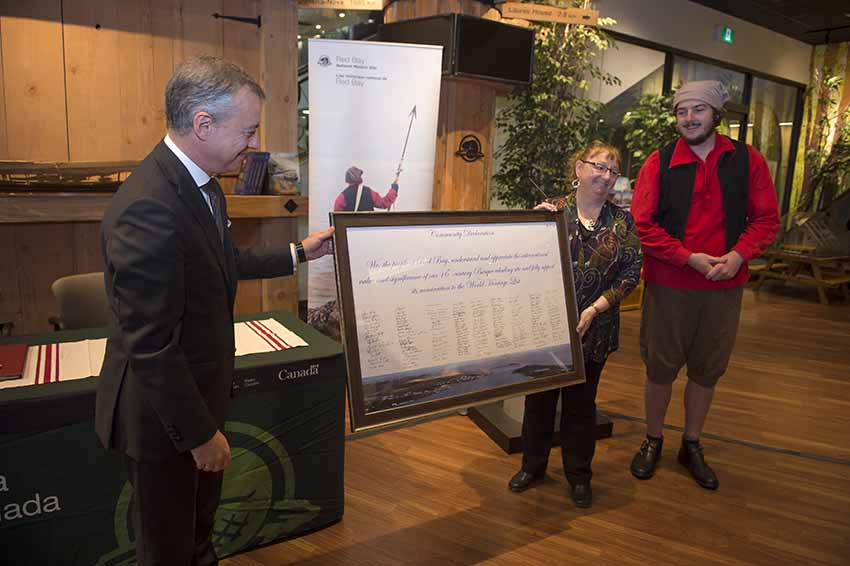Miguel Villameriel/Donostia-San Sebastian. There was a time, in the 16th century, on the frigid coasts of Newfoundland, in the northwest of Canada, when it was considered the land of the Basques. Before the English and the French began a fight over the control of this vast Canadian land, several hundreds of intrepid Basque whalers reached the coasts of Newfoundland and Labrador, not to conquer them, but to coexist with the Inuit peoples who inhabited those lands, and create a whaling station that was regarded for years as the greatest world power in the production of whale oil. A material that was treasured at the time, above all, for powering oil lamps that the Basques distributed afterwards across Europe.
The Basque whaling station in Red Bay was declared as a World Heritage Site by UNESCO in 2013, and is a reference to understand the hunting of whales led by the Basques in the 16th century, despite the thousands of kilometers between them and the Basque coast. Several settlements found in the last few decades in the Eastern Arctic and subarctic in Canada prove the close relationship that existed between the Basques and the Inuit, to the point of some settlements being named “Basque-Inuit Place.” This was not anything timely, but a systematic relationship that contributed to the preponderance of the Basque presence in those lands over many centuries, and even today that can be traced through the toponymy of some of the Newfoundland coastal areas, with at least one hundred place names there of Basque origin.
The peaceful relationship between the Basque whalers and the Canadian natives is a point of pride for both groups that has allowed a new institutional relationship to be forged in the last few years, to support links that were created 500 years ago. Lehendakari, Iñigo Urkullu, took advantage of his latest visit to Canada, at the end of October, to sign an agreement of collaboration with the public entity of Parcs Canada that is in charge of managing, among others, the whaling station at Red Bay in Newfoundland. With his agreement, signed in Ottawa, the Basque Government and the Canadian Government have delved into the preservation of the historic and cultural links that join both peoples.
Urkullu stressed that “The successive archaeological interventions of the Basques and Canadian teams have allowed an understandings of the tangible and intangible legacy of Euskadi in the history and culture of Canada,” he also recalled a story in the National Geographic Magazine that chronicles how the North of Canada was deemed “Land of the Basques,” in the 16th century.
Currently, Red Bay is one of the most precious underwater archaeological sites in America and there lies an interpretation center which explains the history of the Basque halters. The discovery of this station is the fruit of research that began in 1972, by Professor Selma Huxley. Thanks to her studies, a team of underwater archaeologists form Parcs Canada found the whaling ship, San Juan, from the port of Pasaia, that sank in 1565, on the coast of Canada, as well as a valuable space related to the Basque whalers.
It is not only history, but also present. The incredible feat that Basque whalers staged almost five centuries ago, may be revived when the maritime Albaola Factory, also located in Pasaia, completed the reconstruction of the San Juan with traditional methods to try and reach the costs of Newfoundland again. The work at Albaola has been endorsed officially by UNESCO, which has deemed the work going on in the factory in Pasaia as “authentic.”
The signature of an entire people
The presence of the Lehendakari in Canada served to proudly confirm what the inhabitants of Red Bay have felt in regards to these historic links to Basque whalers. The mayor of this small town, sister city of Pasaia since last May, attended the signing of the agreement between the Basque Government and Parcs Canda and presented Urkullu a document that included the signatures of all of the towns citizens of Red Bay asking UNESCO to declare the whaling station as a point of World Heritage. Wanita Stone, the mayor, holds the ties with the Basque Country so close, that she even painted her nails in the color of the Ikurriña, as a sign of her pride.
The contributions of numerous Basque history and maritime scholars are allowing the retrieval of a legacy that is not a minor one, since it refers to the memory of one of the greatest maritime Powers in the 16th century, if not the largest. The Basque Country was then building the most advance ships from the technological point of view, and it also had some of the better prepared European marines. This was also combined with the strengths and skills of harpooners who were the world’s whaling elite. A story that, like the ship San Juan, deserves to come back afloat.
(Published in El Diario Vasco on 11-12-2017)






 Send to a friend
Send to a friend Add comment
Add comment








